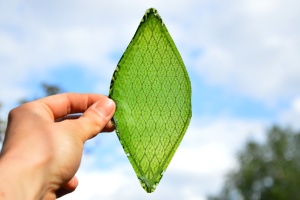As an author of weird science fiction, part of the fun of my job comes from researching advances being made in science and then writing about it. We live in a very interesting time, with advances being made in all sectors of science and engineering. Lines are being crossed in bioengineering and computing which technology thirty years ago only hinted at.
I thought I’d share three innovations in technology that look poised to rock our ways of life. All these inventions were first conceived in the realm of science fiction, which proves that the human imagination is a powerful thing.
Bionic Leaf
Photosynthesis is a pretty cool thing. Plants take an infinitely abundant resource, light, and convert it to energy. Researchers at the Berkeley National Lab have capitalized on nature’s already impeccable design and created something that will be of major benefit to modern society. Instead of using a photovoltaic cell to create electricity directly from sunlight, the bionic leaf made by the researchers creates a chemical reaction that converts solar energy to hydrogen power, which you can then use in a hydrogen fuel cell to generate electricity. These leaves can be huge game-changers in a shifting energy economy and make the transition to alternative fuels more viable. This article was rather interesting.
Exoskeletons
A common trope in military sci-fi, exoskeletons are quickly moving out of the realm of fiction and into fact. The U.S. military is developing several different models of exoskeleton, including the Iron Man-like TALOS suit and a light armor that only hardens upon impact. I heard about the latter armor on a very interesting Joe Rogan Experience podcast with transhumanist Zoltan Istvan. Link is here.
Gene Splicing
Who wouldn’t want to be able to breath underwater, or have tetrachromacy which they can use to see brilliant ultraviolet colors? Bioengineering has always been the stuff of science fiction, arguably since the grandma of the entire genre, Mary Shelley, created Frankenstein’s monster from a hodge-podge of corpse parts. Gene splicing goes to the molecular level and focuses on what DNA proteins are actually made. The DNA of creatures in the kingdom animalia is very similar, which has always been a beacon of hope in the realm of genetic engineering. The major problem with genetics is that genes have many functions. Change one gene, and many aspects of the animal can change. Also, most traits (and certainly organs) are managed by many genes. In short, this is a problem that isn’t as easy as one might think. Kevin Costner’s character in Waterworld would have needed dozens of other mutations in addition to the formation of gills for him to go underwater.
What do you think? Are there any books or stories that you’ve read with sci-fi elements in them that you think may come true? Also, are there any books you’ve read which have interesting premonitions of what introduction of these specific technologies will have for our world?

